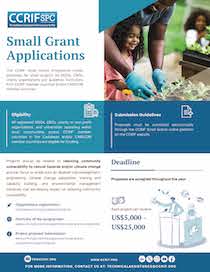Grand Cayman, Cayman Islands, December 12, 2016 - CCRIF SPC (formerly the Caribbean Catastrophe Risk Insurance Facility) made a payout of US$1,110,193 to the Government of Nicaragua as a result of the passage of Hurricane Otto which triggered a payment on the countryís Tropical Cyclone policy. The payment was made on December 9th ñ 14 days after the passage of the hurricane.
This is the second payment made to Nicaragua, following a payment of US$500,000 for a magnitude 6.1 earthquake that occurred on June 9th of this year. The earthquake occurred 114 km (71 mi) NW of Managua, Nicaraguaís capital city and was felt strongly as far away as the capital of neighbouring Honduras.
Otto was the 16th named storm of the 2016 Atlantic Hurricane Season and formed as a Tropical Storm over the southwestern Caribbean Sea near the coast of Panama on November 21st as an extremely late event in the calendar year. According to the National Oceanic and Atmospheric Administrationís best track database, only 18 storms with at least tropical storm strength have formed in late November within the last 65 years in the western Caribbean Sea, and only 9 of them reached hurricane strength.
According to the Nicaraguaís Disaster Management Agency (SINAPRED), there were reports of dozens of houses damaged, fallen trees, floods, landslides and interruptions in potable water and electricity supplies. The Government of Nicaragua evacuated approximately 10,572 people prior to the arrival of Hurricane Otto.
Since its inception in 2007, CCRIF has now made a total of 22 payouts to 10 member governments totalling US$69 million, all within 14 days of the event. This year, CCRIF made nine payouts totalling over US$31 million on six member countriesí tropical cyclone, excess rainfall and/or earthquake policies for four events: Hurricane Earl, the June 9 Nicaragua earthquake, Hurricane Matthew and Hurricane Otto.
Nicaragua was the first Central American country to join CCRIF when the Government signed a Participation Agreement in 2015 and purchased tropical cyclone and earthquake coverage. This was facilitated by the signing of a Memorandum of Understanding between CCRIF and COSEFIN (the Council of Ministers of Finance of Central America, Panama and the Dominican Republic) in April 2015 that allowed those countries to access the high quality catastrophe coverage provided by CCRIF.
Like all CCRIF policies, Nicaraguaís Tropical Cyclone policy is a parametric insurance product, and it makes payments based on the hurricane wind speed and the amount of loss calculated in a pre-agreed model caused by the hurricane. With parametric policies, payouts can be made very quickly after a hazard event. This is different from traditional insurance policies that would make a payment only after an adjustor conducts an on-the-ground assessment of individual losses after an event, which can often take months or even years.
CCRIF CEO, Mr. Isaac Anthony stated that "The CCRIF Board and Team hope this payment will provide some relief and we stand ready to support the Government and people of Nicaragua as they recover from the effects of this hurricane".
About CCRIF SPC: CCRIF SPC is a segregated portfolio company, owned, operated and registered in the Caribbean. It limits the financial impact of catastrophic hurricanes, earthquakes and excess rainfall events to Caribbean and ñ since 2015 ñ Central American governments by quickly providing short-term liquidity when a parametric insurance policy is triggered. It is the worldís first regional fund utilising parametric insurance, giving member governments the unique opportunity to purchase earthquake, hurricane and excess rainfall catastrophe coverage with lowest-possible pricing. CCRIF was developed under the technical leadership of the World Bank and with a grant from the Government of Japan. It was capitalized through contributions to a Multi-Donor Trust Fund (MDTF) by the Government of Canada, the European Union, the World Bank, the governments of the UK and France, the Caribbean Development Bank and the governments of Ireland and Bermuda, as well as through membership fees paid by participating governments. The Central America SP is capitalized by contributions to a special MDTF by the World Bank, European Commission and the governments of Canada and the United States.
English





